I've never been a smoker but I do have a particular interest in the JOB brand of cigarette rolling papers as my house in France was built on the proceeds of the business.
The Spanish had encountered the tobacco plant almost immediately upon their first arrival in the Americas and soon after started regularly transporting back home the dried leaves along with the habit of burning them to inhale the smoke. The city of Seville initially held a monopoly on all commerce with the Spanish colonies and the processing of imported tobacco became established in the city from the 16th century, with the Royal Tobacco Factory in Seville, built in the 1730s, being at the time the second largest building in Spain exceeded only by the enormous royal residence of El Escorial outside of Madrid. A similar although smaller centre of tobacco processing was established in Lisbon, the centre of the Portuguese empire. Until Britain and France gained their own colonies in the Americas, most European tobacco came through Iberia .
The practice of smoking tobacco leaves, either rolled up as cigars, or more commonly (and more cheaply) as shredded pieces stuffed in a clay pipe, rapidly spread throughout Europe. It was introduced to France in the 1560s through Jean Nicot, the French ambassador to Portugal, who gave his name to nicotine. Following Nicot's lead smoking (and the related practice of taking snuff) became fashionable in Charles IX's court and thus spread throughout France. Sir Walter Raleigh was similarly influential in introducing smoking to Elizabethan England. The smoking of tobacco in rolled paper tubes, ie. cigarettes, started in Spain towards the end of the 18th century (they are depicted in some of Goya's paintings) and apparently came to France with soldiers returning from the Peninsular war. These cigarettes were all roll-your-own using whatever scraps of paper were to hand, and although frequently rather rough-tasting, they were convenient and cheap as they didn't require a fragile clay pipe.
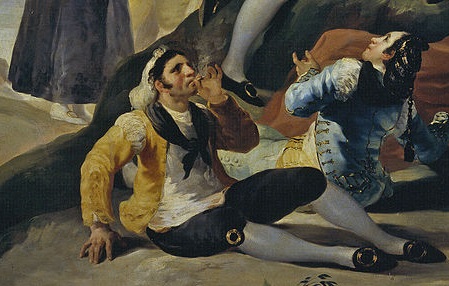
Detail from Goya's 'La Cometa' (1777).
Then in 1838 Jean Bardou, originally a baker in Perpignan, came up with the idea for a booklet of pre-cut rolling papers made of thin, pure rice paper. He patented the idea and started to manufacture the papers at his home in the city. Bardou's trademark, which he printed on all his paper booklets, was his initials, J B, separated by a large diamond which was based on the diamond-shaped blazon of Perpignan. The diamond was often mistaken for a capital O by consumers who thus began referring to the papers as JOB, thus the brand-name 'Papiers JOB' was born.


The diamond blazon of Perpignan with the "sang et or" colours of Catalonia, and its incorporation in the JOB logo.
Initially the small operation was based in Jean Bardou's home employing just his children - Pierre, Joseph, Marie and Magdeleine - plus four other workers who between them undertook all the paper cutting and packaging into booklets, using paper from another manufacturer in the nearby town of Castres. The packages of rolling paper gave a time-saving alternative to the smoker who would otherwise have to cut or tear his own paper from a sheet (or whatever he could find) and they were advertised as being pleasant-tasting, hygienic and healthful. While cigarette-making machines were invented in the mid-19th century, factory-produced, ready-rolled cigarettes remained relatively expensive compared to roll-your-own and they did not start to become really popular before the 1890s.
Jean Bardou died in 1852 (aged just 53) and the JOB brand was bought by his son Pierre who then began making his own papers. At about the same time Pierre's brother Joseph started his own company making 'le Nil' cigarette papers with a 'laughing elephant' as its logo. Although separately owned, the two companies seem to have operated for many years side-by-side out of the same premises in Perpignan (their mutual success was probably because they were deliberately aimed at a different customer base, hence why they operated amicably in tandem). In 1858 Pierre Bardou bought a large apartment building in Perpignan which he then divided into one area for manufacturing and another for his residence. Over the following years he expanded this business into more adjacent buildings with the manufacturing process becoming increasingly automated, driven by steam power. Eventually, although head-office, marketing, design and final packaging remained in Perpignan, I think in the 1870s the actual paper manufacturing side was moved to larger premises near Saint-Girons in Ariège. Nevertheless in 1889 the JOB company in Perpignan still employed 290 women and 40 men and was noted for its good working conditions and employee benefits.
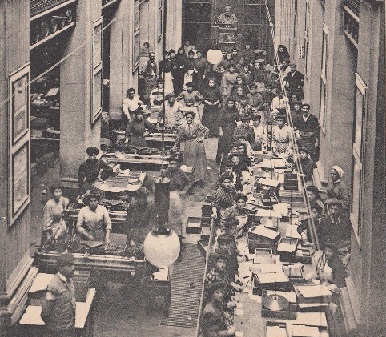
The JOB factory in Perpignan sometime during the late 19th century.
The focus of JOB was always towards premium or luxury papers, including those flavored with licorice, anise, vanilla, juniper or camphor, and with careful marketing, such as using elegant packaging designed to appeal to the higher classes and in particular to female customers. Pierre was an enthusiastic collector and patron of contemporary art and amongst other artists he hired the art nouveau painter Alphonse Mucha to design advertising posters for the JOB brand. Mucha drew a sinuous long-haired goddess holding a rolled cigarette - the image supposedly being inspired by Michelangelo's Sibyls from the Sistine Chapel - and the poster image was so popular that it was sold as a lithograph.
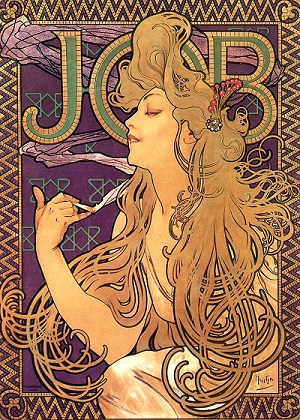
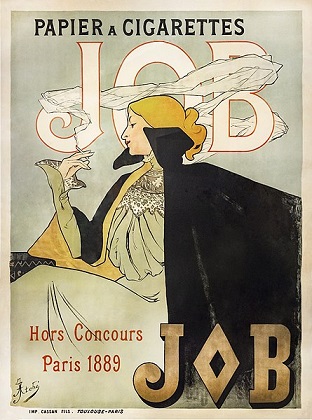
JOB posters by Alphonse Mucha (L) and Jane Atché (R).
In 1857 Pierre Bardou had married Léonie Amiel, the daughter of a fairly humble Perpignan confectioner (she brought no dowry) and they subseqently had three children, who after his wife's early death in 1871 were looked after by his sister-in-law, Henriette Amiel. His eldest daughter, Camille (1858–1934), married Charles Ducup de Saint-Paul, a senior officer in the French army; his son, Justin (1860–1930) married the daughter of a successful lawyer; and his youngest daughter Jeanne (1868–1918) married Jules Pams, who was a an attorney and politician with a family fortune earned from maritime trade. While Pierre Bardou was an enthusiastic collector of "curiosities", Jules Pams was an enlightened amateur artist and patron of contemporary art, and in effect he became Bardou's artistic adviser. Jeanne and Jules Pams moved into the Hôtel de l'Industrie (the JOB business premises) which became known as the Hôtel Pams (today it's a designated monument historique owned by the city of Perpignan and used as a conference suite or classy business, exhibition and wedding venue).
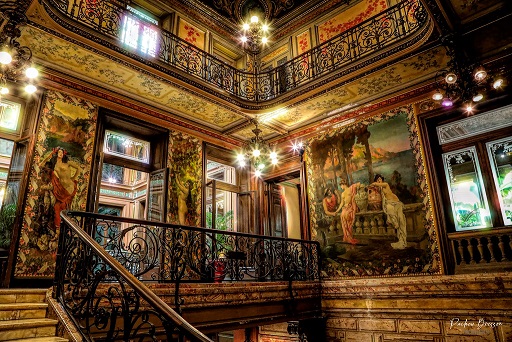
The splendid interior of the Hôtel Pams in Perpignan, the residential bit of the JOB business premises, with paintings, murals, mosaics, stained glass and statues by well-known artists of the late 19th century.
Towards the end of the 19th century and now very wealthy indeed, Pierre Bardou (now officially called Pierre Bardou-Job as he'd obtained a Presidential decree to change his name in 1878) commissioned the Danish architect Viggo Dorph-Petersen to design a chateau for each of his children, although unfortunately the buildings were not completed until after Pierre's death (on 24 February 1892, aged 65). Justin was given Château d'Aubiry in Cérèt, Camille was given Château Ducup-St.Paul in Perpignan and Jeanne was given Château Valmy in Argelès-sur-Mer.
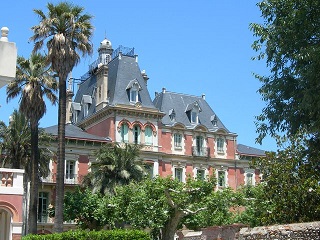

Château Ducup-St.Paul and Château Valmy ... not bad for being built on the proceeds of just selling small pieces of paper,

... and the grandest of the three, Château d'Aubiry at Cérèt, built between 1893 and 1904.
While Château d'Aubiry was under construction for Justin Bardou, Dorph-Petersen also built a much humbler house for him about 15 km away in the wooded foothills of the mountains, to serve as a hunting lodge or weekend rural retreat away from the main house at Cérèt. That small 'pavillon de chasse' is now my home.
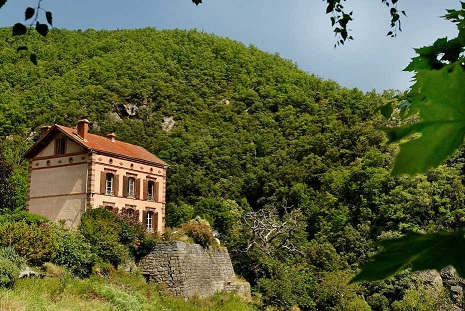
Home sweet home.
As a family business I don't think JOB survived much beyond the First World War although as a company it certainly existed until at least the 1950s and indeed it still exists as a registered brand name as part of the Republic Tobacco Group based in Detroit, Illinois. I believe there's still at least one manufacturing plant ostensibly under the name JOB that's in operation (at Toulouse I think as I seem to remember a well-publicised strike at the plant a few years ago).
All the grand châteaux and other houses once owned by various members of the Bardou family passed into other hands during the 20th century and I don't know what happened to the family themselves. What is now my home was acquired in the 1930s (perhaps on the death of Justin Bardou in 1930) by a wealthy family from Barcelona as a bolt hole should it be necessary to escape from Franco's fascist forces in the unfolding Spanish Civil War (which they did although within a few years the south of France was occupied by the Nazis and so I think they fled then back to Spain although they were still the owners of the house into the 1950s).
In Britain I don't think the brand name JOB is widely known - I expect Rizla is more familiar albeit that too was originally a French company - but in France and throughout French overseas territories and ex-colonies the name JOB remains culturally well-known and I'm sure it is still possible to buy JOB rolling papers at your local tabac in any French city.
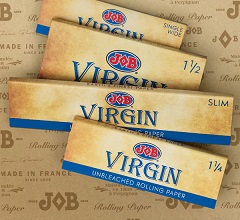
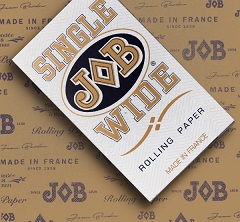
Modern JOB rolling papers marked "made in France" as depicted on their website (2022) although I'm not sure eactly where they are manufactured as the original factory in Toulouse, built in 1937, closed some years ago and was derelict when this photo was taken in 2006. I expect the site has been completely redeveloped by now.
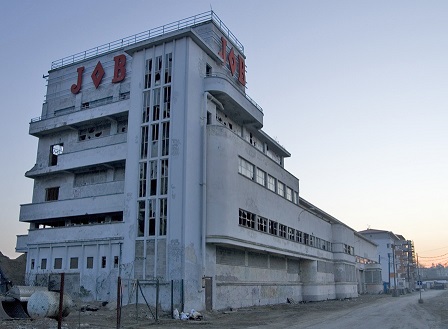
PS (on 31/10/22):
The old JOB building in Toulouse was indeed sold and then renovated as offices and a cinema complex in 2011, but the external appearance was completely restored (it's likely a listed building) and is essentially unchanged with even the old JOB logo being retained. The JOB company, its brand name and the manufacture of its products, had been taken over in 1986 by the French Bolloré group who already produced the OCB brand of rolling papers. Then in 2000 the paper-manufacturing division of Bolloré was acquired by Republic Technologies France (part of Republic Technologies Inc. of Detroit). Both JOB and OCB cigarette papers are now manufactured by Republic Technologies in a newly-built factory just outside of - wait for it - Perpignan! And I never knew.
